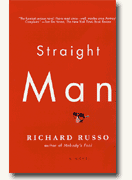Straight Man
Richard Russo
book reviews:
·
·
·
·
·
·

·
·
·


|
  |
Straight Man
Richard Russo
Vintage
Paperback
416 pages
June 1998

 
|
|
|
 
Amid all the quips and clever comebacks that fly through the halls of the
dysfunctional English department at West Central Pennsylvania University
in Richard Russo's (Nobody's Fool) latest novel, you find
the reason for both all the antagonistic levity and the book's title.
William Henry Devereaux, Jr., the story's narrator, states clearly:
In English departments the most serious competition is for
the role of straight man.
 Hank Devereaux, temporary
department chair and determined wild card, revels in creating harmless
chaos in his little corner of academia, and so rarely gets to play that
coveted "straight man" role. He's a wisecracker who intentionally tries
to hold the bad stuff in life at bay. He's a convincing, friendly
point-of-view man, however, and his voice succeeds at drawing us into
this hilarious, poignant novel of academe. Hank Devereaux, temporary
department chair and determined wild card, revels in creating harmless
chaos in his little corner of academia, and so rarely gets to play that
coveted "straight man" role. He's a wisecracker who intentionally tries
to hold the bad stuff in life at bay. He's a convincing, friendly
point-of-view man, however, and his voice succeeds at drawing us into
this hilarious, poignant novel of academe.
Continuing funding slashes have got rumors of staff cutbacks running
rampant, and Hank's colleagues suspect him of having prepared a "list"
that recommends who should get the boot, regardless of tenure. Hank
hasn't, but it's not in his character to tell them if he has or not, and
the English department threatens mutiny, calling a vote for a new chair.
That each and every member of the department should fear firing is not
surprising, for paranoia is part of the academic game, and every person
on staff has good reason for suspecting he (or she) won't make the grade.
There's white linen-suited Finny, who outed himself just long enough to get divorced before
reverting to claims of heterosexuality that no one believes, and who has
a Ph.D. from American Sonora University,
an institution that exists, so far as we've been able to
determine, only on letterhead and in the form of a post office box in
Del Rio, Texas, the onetime home, if I'm not mistaken, of Wolfman Jack.
There's nontenured Campbell "Orshee" Wheemer, the pony-tailed
protofeminist who forbids books and writing in his classes (he uses
taped TV sitcoms and makes his students turn in video cassettes for
semester projects), who appends every use of the masculine pronoun in
department meetings with "or she." There's the aging prima-donna poet
Gracie DuBois, whom every man in the college lusted over back when she
was hired twenty years ago, now gone to fat; she's got a harassment suit
in the works against Hank concerning his eternal wisecracking. There's meek Teddy Barnes,
Hank's erstwhile best friend, who's been a little bit in love with
Hank's wife for years; there's June, Teddy's wife, who is rumored
to be having an affair with Orshee. There's Paul Rourke, Hank's nemesis
and neighbor, who's sworn never to laugh at anything Hank says. And
there's Hank, who hasn't published a book since his own hiring almost
half his lifetime ago.
While he wrestles with this motley crew over department matters, Hank's
got much more in life that demands his attention. His daughter, who
has failed to inherit Hank or his wife Lily's love of language and writing,
is in deep debt moneywise over her house (a copy to the room of her
parents') and on the outs with her unemployed husband. Hank himself is
unsure whether or not he'd care if he got canned. Lily is checking out
distant job opportunities, and Hank vaguely suspects that she's having
an affair with his dean. His adopted dog has developed enough
self-assurance to "groin" everyone who visits. He worries that he's
developing a stone -- as runs in the men in his family -- due to his
having one hell of a time trying to pee. The biggest thing is perhaps
his mother's informing him that the man he's tried hard not to think
much about for most of his life, the father who deserted Hank and his
mother for a succession of trophy graduate students, is going to be
making a reappearance, perhaps for good, in their lives.
This novel of campus, family, midlife crisis and death threats against
ducks bursts with humor and tenderness. Richard Russo has created
characters who come quickly to colorful life. You won't want the story
to end because you want to keep on seeing Hank Devereaux's world through
his incomparable eyes. You will, however, be happy that you spent some
time along with him for the ride.
|
|



 Hank Devereaux, temporary
department chair and determined wild card, revels in creating harmless
chaos in his little corner of academia, and so rarely gets to play that
coveted "straight man" role. He's a wisecracker who intentionally tries
to hold the bad stuff in life at bay. He's a convincing, friendly
point-of-view man, however, and his voice succeeds at drawing us into
this hilarious, poignant novel of academe.
Hank Devereaux, temporary
department chair and determined wild card, revels in creating harmless
chaos in his little corner of academia, and so rarely gets to play that
coveted "straight man" role. He's a wisecracker who intentionally tries
to hold the bad stuff in life at bay. He's a convincing, friendly
point-of-view man, however, and his voice succeeds at drawing us into
this hilarious, poignant novel of academe.